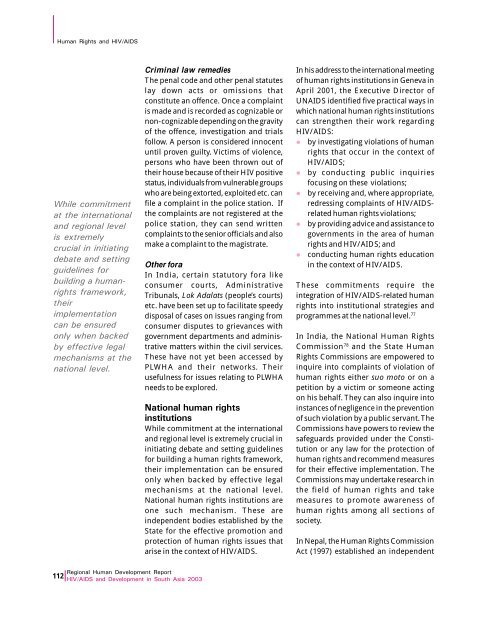Download Report - UNDP Asia-Pacific Regional Centre - United ...
Download Report - UNDP Asia-Pacific Regional Centre - United ...
Download Report - UNDP Asia-Pacific Regional Centre - United ...
You also want an ePaper? Increase the reach of your titles
YUMPU automatically turns print PDFs into web optimized ePapers that Google loves.
Human Rights and HIV/AIDSWhile commitmentat the internationaland regional levelis extremelycrucial in initiatingdebate and settingguidelines forbuilding a humanrightsframework,theirimplementationcan be ensuredonly when backedby effective legalmechanisms at thenational level.Criminal law remediesThe penal code and other penal statuteslay down acts or omissions thatconstitute an offence. Once a complaintis made and is recorded as cognizable ornon-cognizable depending on the gravityof the offence, investigation and trialsfollow. A person is considered innocentuntil proven guilty. Victims of violence,persons who have been thrown out oftheir house because of their HIV positivestatus, individuals from vulnerable groupswho are being extorted, exploited etc. canfile a complaint in the police station. Ifthe complaints are not registered at thepolice station, they can send writtencomplaints to the senior officials and alsomake a complaint to the magistrate.Other foraIn India, certain statutory fora likeconsumer courts, AdministrativeTribunals, Lok Adalats (people’s courts)etc. have been set up to facilitate speedydisposal of cases on issues ranging fromconsumer disputes to grievances withgovernment departments and administrativematters within the civil services.These have not yet been accessed byPLWHA and their networks. Theirusefulness for issues relating to PLWHAneeds to be explored.National human rightsinstitutionsWhile commitment at the internationaland regional level is extremely crucial ininitiating debate and setting guidelinesfor building a human rights framework,their implementation can be ensuredonly when backed by effective legalmechanisms at the national level.National human rights institutions areone such mechanism. These areindependent bodies established by theState for the effective promotion andprotection of human rights issues thatarise in the context of HIV/AIDS.In his address to the international meetingof human rights institutions in Geneva inApril 2001, the Executive Director ofUNAIDS identified five practical ways inwhich national human rights institutionscan strengthen their work regardingHIV/AIDS:l by investigating violations of humanrights that occur in the context ofHIV/AIDS;l by conducting public inquiriesfocusing on these violations;l by receiving and, where appropriate,redressing complaints of HIV/AIDSrelatedhuman rights violations;l by providing advice and assistance togovernments in the area of humanrights and HIV/AIDS; andl conducting human rights educationin the context of HIV/AIDS.These commitments require theintegration of HIV/AIDS-related humanrights into institutional strategies andprogrammes at the national level. 77In India, the National Human RightsCommission 78 and the State HumanRights Commissions are empowered toinquire into complaints of violation ofhuman rights either suo moto or on apetition by a victim or someone actingon his behalf. They can also inquire intoinstances of negligence in the preventionof such violation by a public servant. TheCommissions have powers to review thesafeguards provided under the Constitutionor any law for the protection ofhuman rights and recommend measuresfor their effective implementation. TheCommissions may undertake research inthe field of human rights and takemeasures to promote awareness ofhuman rights among all sections ofsociety.In Nepal, the Human Rights CommissionAct (1997) established an independent<strong>Regional</strong> Human Development <strong>Report</strong>112 HIV/AIDS and Development in South <strong>Asia</strong> 2003
















